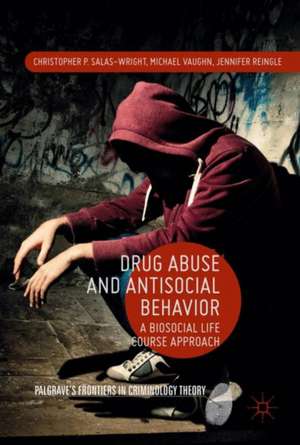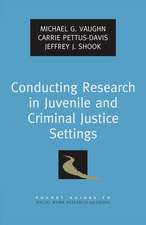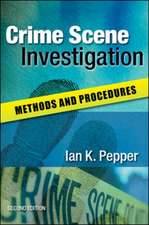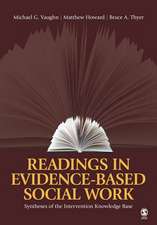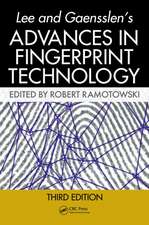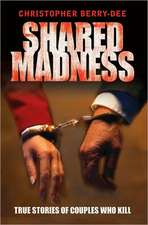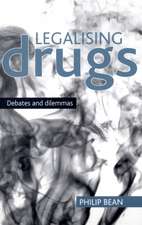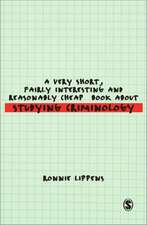Drug Abuse and Antisocial Behavior: A Biosocial Life Course Approach: Palgrave's Frontiers in Criminology Theory
Autor Christopher P. Salas-Wright, Michael G. Vaughn, Jennifer M. Reingle Gonzálezen Limba Engleză Hardback – 2 mai 2017
Preț: 727.31 lei
Preț vechi: 886.97 lei
-18% Nou
Puncte Express: 1091
Preț estimativ în valută:
139.17€ • 151.65$ • 117.27£
139.17€ • 151.65$ • 117.27£
Carte tipărită la comandă
Livrare economică 23 aprilie-07 mai
Preluare comenzi: 021 569.72.76
Specificații
ISBN-13: 9781137558169
ISBN-10: 1137558164
Pagini: 200
Ilustrații: XVII, 219 p. 9 illus.
Dimensiuni: 148 x 210 x 14 mm
Greutate: 0.44 kg
Ediția:1st ed. 2016
Editura: Palgrave Macmillan US
Colecția Palgrave Macmillan
Seria Palgrave's Frontiers in Criminology Theory
Locul publicării:New York, United States
ISBN-10: 1137558164
Pagini: 200
Ilustrații: XVII, 219 p. 9 illus.
Dimensiuni: 148 x 210 x 14 mm
Greutate: 0.44 kg
Ediția:1st ed. 2016
Editura: Palgrave Macmillan US
Colecția Palgrave Macmillan
Seria Palgrave's Frontiers in Criminology Theory
Locul publicării:New York, United States
Cuprins
Chapter 1. The Scope of the Problem.- Chapter 2. Prevailing Conceptions of Drug Abuse and Addiction.- Chapter 3. Genetic Underpinnings.- Chapter 4. Neurobiological Contributions.- Chapter 5. Childhood Antecedents of Drug Abuse and Antisocial Behavior.- Chapter 6. Adolescent Drug Use and Delinquency.- Chapter 7. Adulthood, Addiction, and Antisocial Behavior.- Chapter 8. Prevention and Treatment.- Chapter 9. The Road Ahead
Notă biografică
Christopher Salas-Wright is Assistant Professor in the Boston University School of Social Work, USA. He serves on the editorial boards of Journal of Youth and Adolescence and Journal of Criminal Justice.
Michael Vaughn is Professor and Director of the Interdisciplinary PhD program in the School of Social Work, College for Public Health and Social Justice at Saint Louis University, USA. He is an internationally recognized scholar in the areas of drug abuse and crime.
Jennifer Reingle Gonzalez is Assistant Professor of Epidemiology at the University of Texas School of Public Health in Dallas, USA. She has authored a leading textbook on research methods in criminology and criminal justice.
Textul de pe ultima copertă
This book is rooted in the conviction that human biology plays a critical role in understanding drug abuse and antisocial behavior. In the same breath, however, it fundamentally affirms the importance of the many social and environmental factors that influence our behavior across the life course. The study begins with an overview of the scope of the problem of drug abuse and crime, and an examination of how these problems often feed into one another. Building upon that foundation, the focus shifts to a review of cutting-edge research on the genetics and neurobiology of addiction and antisocial behavior across the developmental periods of childhood, adolescence, and adulthood. An exploration of the implications of a biosocial life course approach in terms of drug abuse prevention, and an examination of what lies ahead for drug abuse and criminological research conclude this detailed and timely book. Policy makers, practitioners and scholars of criminology and sociology will find this of particular interest.
<
“Is there anything new under the sun on the topic of drug abuse? Yes! This must-read book brings together the latest science, biological, social, and life-course developmental, in one very readable package. I recommend it for experts and for students encountering the topic of drug abuse for the first time.”
Terrie Moffitt,
Professor, Duke University and King’s College London, UK
<
“A top-notch synthesis – with all the necessary nuances – of the present biosocial state of knowledge with regards to drug abuse and antisocial behavior across the life course.”
Richard E. Tremblay
Professor, University College Dublin, Ireland, and University of Montreal, Canada
Caracteristici
Provides fresh insight into the complex relationships between drug abuse and crime Presents cutting-edge research on the genetics and neurobiology of addiction and antisocial behavior Illustrates the importance of biosocial and life course theory in understanding the onset, escalation, and cessation of drug abuse and criminal behavior
